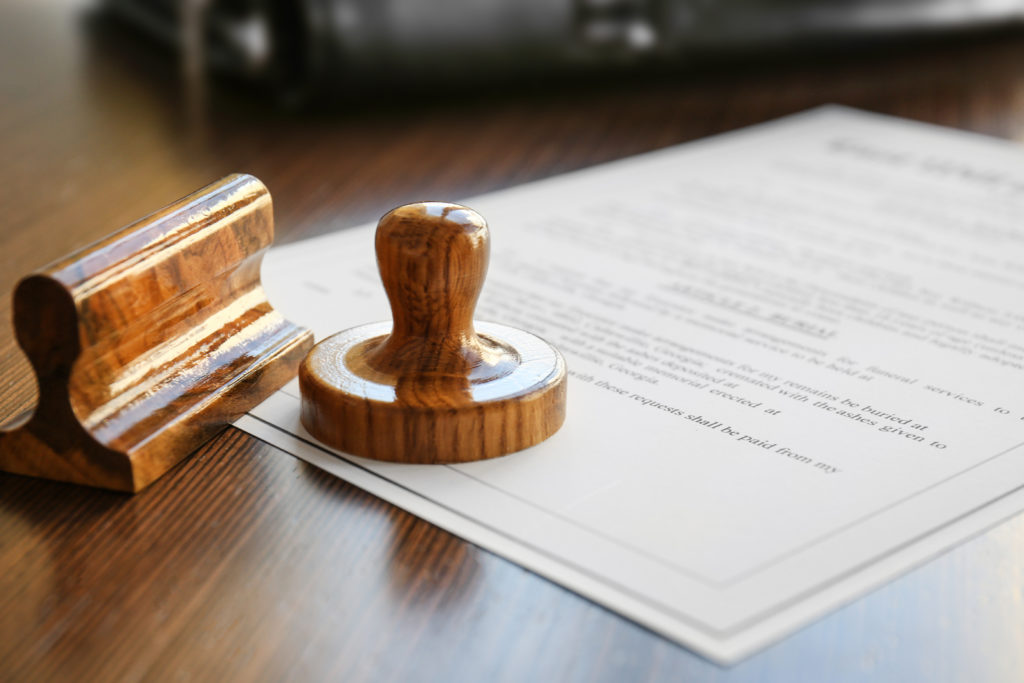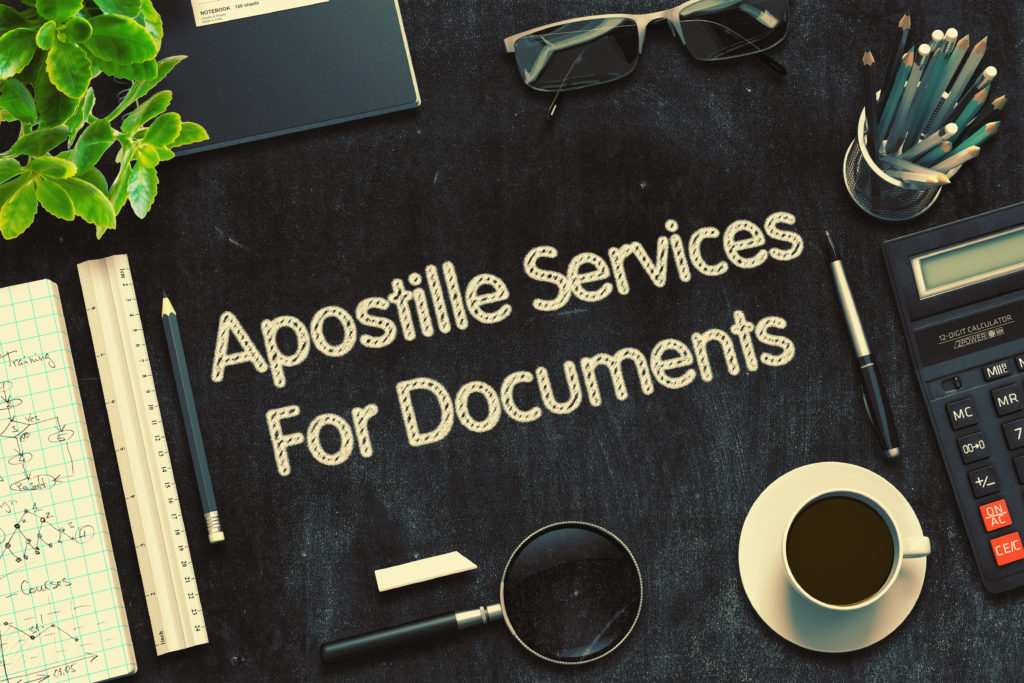At some point or another, you have likely encountered the need to get a document notarized. You probably found yourself in a post office or a bank where some stranger with a stamp suddenly made your document more official. What makes this person qualified to wield to the power of the notary stamp? Why do you need it in the first place? Worry not, in this article we are going to answer every question you have about the mysterious notary public.
What is a Notary Public?
Simply put, a notary public is a certified professional that bears witness to the signing of important documents. Having a trained, impartial representative present during these signings helps deter fraud and provides legal integrity.
It is the job of a notary public to ensure a person signing a document is indeed who they say they are. In fact, a notary public is there to protect the people that are signing the document. A notary public will ensure every person signing the document at hand is in their right mind, understands the contents of the document, and is, in fact, signing willingly.
A notary public is meant to be a truly unbias third party. Every certified notary public is bound by an oath to act objectively. Therefore, if a notary finds themselves in a professional situation in which they have a personal interest, they must gracefully refer the client to another notary public.
When Do I Need a Notary Public?
Currently, there is no hard and fast list of documents that require notarization. This is in large part due to the fact that every state has different laws and requirements. However, some common documents that require notarization are:
- Wills
- Prenuptial agreements and divorce papers
- Government documents
- Property deeds and mortgage documents
- Affidavits
- Power of attorney transfers
- Court-appointment paperwork
- Business contracts
- Various legal and financial documents
Often times, notarization is not required unless you are told to do so by a bank or lawyer. Sometimes, it is a personal choice based on whether or not you feel the need to be protected. If you are worried about involved parties contesting their signatures, or state of mind upon signing, save yourself some legal trouble later and get your document notarized.
Why is Notarizing a Document Important?
Most documents requiring notarization are dealing with important subject matter. Whether it marks the purchase of your family’s first home or finalizing your will and your children’s future – these documents can often lead to legal disagreements down the road. Having an unbiased third party (i.e. a notary) witness the signing of these documents can, and often has, prevented possible legal battles. A notary ensures that everyone understands and agrees to what they are signing.
Types of Notarizations
Interestingly enough, there is more than one way to notarize a document. In fact, there are three types of notarizations.
- Acknowledgments – This is the most common and well-known type of notarization carried out by a notary public. An acknowledgment requires that the notary public confirm the identity of the person that is signing the document in-person. This is typically done with a drivers license or passport. However, means of verification can vary by state. The notary public will then confirm that the signatory understands the document in full, and is signing at their own will. Finally, the notary will sign and stamp the document.
- Jurats – A jurat takes an acknowledgment notarization one step further by requiring the client to take an oath. The client must orally acknowledge that the contents of the document are true. Nods of the head or silent gestures of confirmation are not satisfactory. The notary public will inform the signatory that falsifying information is considered perjury and is punishable by law.
- Certifications of Copies – This is the least common type of notarization, as it is not acceptable in all states. However, some states allow a notary to confirm that a duplicate of a specific document is, in fact, a word-for-for identical copy.
What is Needed to Notarize a Document?
As with any transaction, there are certain things both parties need to have prepared in order to successfully get a document notarized. Read on to find out how to be prepared for a quick and effective notary appointment.
Form of Identification
First and foremost, the person (or people) expected to sign the document in question must provide legal and accurate identification. A simple photo is not enough. Identification must include a photo, physical description, signature, and issuing authority. As previously mentioned, a drivers license or a passport are the most common and effective forms of identification. If you do not have either of those items, there are other acceptable forms of identification. However, these can vary by state, so save yourself an extra trip by calling your notary to confirm that your form of i.d. is acceptable.
The Document
One might think this goes without saying, but do not forget to bring the document that needs to be signed! To streamline the notarization process, be sure to fill out the document in full before the appointment. However, it is essential that you do not sign/initial any part of the document until the notary is present.
All Parties Involved
Most documents calling for notarization require signatures from more than one person. You can save yourself precious time and money by having all of the required parties present at once for notarization. You can, legally, have the individuals involved get their signatures notarized separately. Unfortunately, this draws out the process and requires multiple notary fees. So unless you are dealing with a particular unfriendly divorce, save yourself the trouble and make a little party out of your trip to the notary.
Notary Fee
As you may have suspected, most notarizations do come with a price tag. The standard fee is anywhere from $2-$20 per signature. However, several states have legally capped the amount a notary can charge. For example, in California, notary’s can charge a maximum of $10 per signature. However, they can legally charge extra fees for services such as travel if they are a mobile notary (more on that later).
Furthermore, there are exceptions to every rule. For instance, notarizations involving mortgages often have a higher fee. For more information regarding types of fees and who charges what and where visit this article on notary fees.
Notary Stamp
The notary stamp (seal) is a must-have element of any authentic notarization. Not only will the professional notary public be appropriately certified, but they will come bearing the illustrious notary stamp. The stamps vary widely from state to state, but it is universally true that a document is not officially notarized until the notary stamp has been applied.
The stamp itself will be personalized to each specific notary public with their name, state of certification, and date of certification expiration. Visually speaking, seals vary widely in appearance. Some seals are round, some rectangle, some have pictures, others simply detail the appropriate text.
What does the Seal Stand for?
A document stamped with a notary seal ensures that the document was, in fact, signed by the person (or people) whose signatures appear on the document. Furthermore, the seal ensures that all signatory parties signed at their own free will, and with a full understanding of the document as a whole.
Additionally, the seal confirms that the notary public present at the time of signing was a properly certified representative of the state.
Notary Public vs. Notary Signing Agent
Contrary to what you may think, a notary public is not the same thing as a notary signing agent. All notary signing agents are also a certified notary public, but the opposite is not true. A notary public must get an extra certification to be considered a notary signing agent. So what is the difference, really?
Notary Signing Agent
Once a person is certified as a notary public, they can extend their training further to become a notary signing agent. Think back in this article when we discussed pricing of a notarization service – remember how mortgage notarizations often cost more? That is because notarizations dealing with mortgages and loans (of any kind) require more extensive knowledge of the material discussed within the documents involved.
Notary signing agents must understand how the process of financial lending works. This is the primary difference notary signing agents and a notary public. It is not required that a certified notary public understand the documents that they are notarizing. While a notary signing agent needs to understand the loan paperwork involved, they are not legally allowed to translate and/or advise their clients regarding the documents. Which brings us to…
Notary Public vs. Lawyer
It is vital to understand that a notary public is not a lawyer. The same is true of a notary signing agent. Now, that is not to say a lawyer cannot, in fact, be a notary public. It is not uncommon for a lawyer to acquire a notary public certification. However, a notary certification alone does not give a notary public the ability to give legal counsel to their clients. In fact, a notary public is not even allowed to advise their clients on the legal proceedings that may be involved in the documents they are notarizing.
This is an important distinction here in the United States. Most Hispanic countries have Notarios Publicos, which are trained and certified as attorneys and provide legal counsel to their clients. Therefore, if a notary public is working with an immigrant here in the U.S., it is vital they inform their client to seek legal counsel if necessary to understand the documents they are signing.
When do you Need a Lawyer?
On that note, it is important to reiterate that the job of a notary public is to ensure the authenticity of the signatures on a document. An authentic signature not only means authenticating identity but confirming the client understands and is signing at their own free will.
That is to say, if you are getting a document notarized, be sure you have read and fully comprehend every page before visiting a notary public. Legal documents are notorious for being filled with complex legal jargon that is hard to understand without a law degree. Therefore, if you have any questions about the document at hand, consult a lawyer before signing anything.
Where to Find a Notary Public
Now that we fully understand what a notary public is and why we need them, where can you find a certified notary public? Fortunately, it is easier than ever to get documents notarized. Here are a few examples of where you might find a certified notary public:
- A bank
- A law firm
- The post office or various shipping stores
- Your own office – depending on your company, you more than likely have a notary sitting in your office right now!
- Your local library
- Local government agencies
- Various mobile notary services
Naturally, these options vary based on your location and come with different price tags. Here is some more detailed information regarding some of the above examples.
Banks
Arguably the most common place to find a certified notary public is a bank. Better yet, if you are an account holder, some banks even offer complimentary notary services to their clients. Bigger bank chains tend to only offer notary services to their account holders. As you may suspect, this helps minimize their liability against curating possible fraud.
On the other hand, credit unions and smaller banks are more inclined to offer notary services to non-account holders. Typically, the fees are lower than they might be elsewhere.
Local Government Agencies
County clerk’s office and post offices tend to be an easy local spot to find a notary. Better still, these agencies tend to offer more affordable notary services. As always, be sure to call ahead to see if they offer a notary public service and how much it is. Keep in mind, most notary services are priced per signature.
Places you Frequent
Bottom line: when searching for a notary public, start with places that are a part of your daily life already. From grocery stores to post offices, notaries are out there! More often than not, you do not have to go out of your way to find a certified notary public.
Mobile Notary
Better yet, why seek out a notary when they can come to you! In the age of ultimate convenience when you can have almost anything delivered right to your doorstep, why not do the same with a notary public! This option is becoming more and more common in the workplace, as well as with personal notarizations. Service availability varies depending on your place of residence.
How to Become a Notary Public
If you are looking for a new source of income with flexible hours, you may want to consider becoming a notary yourself! “But, how do I do that?”. Read on to find out!
Steps to Getting a Notary License
While the following steps vary from state to state, the general procedure for becoming a notary is as follows:
- Meet your states specific mandatory requirements (18 years or older, no criminal record, etc.)
- Submit a completed application
- Pay the required application fees (cost varies by state)
- Complete a certification course (requirement varies)
- Pass the state notary public exam (requirement varies)
- Send in background check and fingerprints (requirement varies)
- Hooray! You got your commission certificate in the mail!
- File your certificate with your state’s notary regulatory (typically the Secretary of State’s office)
- Procure your official notary supplies (personalized stamp, certificate, log for notarizations)
Let’s dive into a few of those topics in a little more detail, shall we?
Notary Training
Interestingly enough, less than a dozen states require mandatory training to become a notary public. Florida, Montana, Missouri, Colorado, Nevada, California, Pennsylvania, Oregan, and North Carolina are the nine states that require notary training. However, many other states encourage future notaries to invest in training. Notary courses are available online or in person. On average, training costs less than $200 and takes between 3-6 hours.
The Notary Exam
As with notary training, not all states require you take and pass a notary text to become certified. States that require a passing test score are Connecticut, Colorado, Hawaii, New York, Nebraska, Montana, Lousiana, California, North Carolina, Utah, Oregan, and Maine. Strangely enough, several of the aforementioned states do not require training but require a passing exam score.
Notary Bonds and Insurance
It should come as no surprise that insurance is a good idea if you are thinking about becoming a notary. Considering a notaries role involving documents of great importance, it is a good idea to have coverage in case of a misstep.
Most states require notaries have surety bonds to protect the consumer. While not required by the state, it is wise to invest in errors and omissions insurance as a notary. State notary laws are designed to protect the public, not the notary public.
How to Prevent Notary Claims
Speaking of insurance… while it is great to have, let’s discuss how to prevent the need to use it in the first place. Some tips to prevent notary claims:
- Never notarize documents with black spaces
- Only notarize documents in which the signer is present
- Follow the appropriate steps to ensure the signer is who they say they are
- Be impartial, and do not advise – remember – notaries cannot act as an attorney
- Keep a thorough journey of all completed notarizations
- A foundational element of notarization is ensuring all parties are signing under their own free will – never push or pressure a client to sign a document
- Your notary seal has your name on it – so you should be the only one to use it
- Don’t let your certification expire – most states last four years, it is on your stamp so keep an eye on it!
All of the above tips are great but are just the tip of the iceberg. Even if your state does not require training, take a course anyway to make sure you are up-to-date of your state’s notary laws. Doing so could save you from a frightful lawsuit.
Notary Public Income
With over 4 million certified notaries nationwide, supply is definitely outweighing demand. Considering many companies have in-house notaries, it is becoming harder for independent notaries to drum up consistent business. On average, notaries make between $9-21 an hour. Naturally, these numbers vary greatly depending on your location. Some notaries are able to charge certain fees to help increase income. The best example is mobile notaries charge extra for travel.
Furthermore, many people use their notary public certification as the mandatory stepping stone to becoming a notary (loan) signing agent. Income levels are much greater with this certification. Depending on the document(s) involved, notary signing agents can make between $75-$200 per appointment.
Notary Public: A Brief History
As this article comes to a close, we want to leave you with a piece of history. Notaries can be traced back to Ancient Egypt in 2700 BC. That is over 4,700 years ago! Back then they were called “scribes”, and every important document had to pass through their hands.
However, it was in 535 A.D. in the Roman Empire that the true ancestors of the notaries were born. Due to the fact that literacy was uncommon in this time, those who could read and write often helped others prepare important documents for a fee.
The Notary Public: In Summary
At the end of the day, everyone is going to need the services of a certified notary public at some point or another in their lives. Fortunately, there are more ways to find proper notarization services than ever. From your local bank to the Uber of notaries, you should have no trouble finding a notary public near you. Finally, notary laws vary widely from state to state. So be sure to make sure you are going through the proper legal channels for your specific state.
Sources
https://www.nationalnotary.org/knowledge-center/about-notaries
https://www.incfile.com/blog/post/where-can-i-find-a-notary-public-and-why-might-i-need-one/
http://www.shakelaw.com/blog/notaries-need-one/
https://www.notarize.com/knowledge-center/what-is-a-notary-acknowledgement
https://www.thebalance.com/notary-fees-315710
https://www.nationalnotary.org/knowledge-center/about-notaries/stamp-seal-information
https://www.nationalnotary.org/knowledge-center/about-notaries/how-to-become-a-notary-public
https://www.nationalnotary.org/texas/insurance
https://wellkeptwallet.com/make-money-as-a-notary/
https://www.notarypublicstamps.com/articles/what-does-a-notary-public-do/




